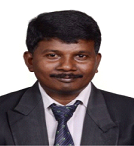Our department is committed to produce well qualified electrical engineers to meet current industrial and social needs through state of art infrastructure, excellent teaching and learning process, human values and continual improvement
PO/PEO :
PROGRAMME OUTCOMES (POs) :
The graduates will have the ability to
a. Apply the Mathematical knowledge and the basics of Science and Engineering to solve the problems pertaining to Electronics and Instrumentation Engineering.
b. Identify and formulate Electrical and Electronics Engineering problems from research literature and be ability to analyse the problem using first principles of Mathematics and Engineering Sciences.
c. Come out with solutions for the complex problems and to design system components or process that fulfil the particular needs taking into account public health and safety and the social, cultural and environmental issues.
d. Draw well-founded conclusions applying the knowledge acquired from research and research methods including design of experiments, analysis and interpretation of data and synthesis of information and to arrive at significant conclusion.
e. Form, select and apply relevant techniques, resources and Engineering and IT tools for
Engineering activities like electronic prototyping, modeling and control of systems and also being conscious of the limitations.
f. Understand the role and responsibility of the Professional Electrical and Electronics Engineer and to assess societal, health, safety issues based on the reasoning received from the contextual knowledge.
g. Be aware of the impact of professional Engineering solutions in societal and environmental contexts and exhibit the knowledge and the need for Sustainable Development.
h. Apply the principles of Professional Ethics to adhere to the norms of the engineering practice and to discharge ethical responsibilities.
i. Function actively and efficiently as an individual or a member/leader of different teams and
multidisciplinary projects.
j. Communicate efficiently the engineering facts with a wide range of engineering community and others, to understand and prepare reports and design documents; to make effective presentations and to frame and follow instructions.
k. Demonstrate the acquisition of the body of engineering knowledge and insight and Management Principles and to apply them as member / leader in teams and multidisciplinary environments.
l. Recognize the need for self and life-long learning, keeping pace with technological challenges in the broadest sense.
PROGRAM EDUCATIONAL OBJECTIVES (PEOs) :
Bachelor of Electrical and Electronics Engineering curriculum is designed to prepare the graduates having attitude and knowledge to
1. Have successful technical and professional careers in their chosen fields such as circuit theory, Field theory, control theory and computational platforms.
2. Engross in life long process of learning to keep themselves abreast of new developments in the field of Electronics and their applications in power engineering.
PROGRAM SPECIFIC OUTCOMES (PSOs) :
Students will be able to
1. Critically evaluate and obtain solutions for electrical and electronics engineering problems by suitable mathematical approaches and procedures.
2. Design, simulate and develop systems for applications including electrical drives, power systems and control systems using appropriate tools.
3. Acquire the leadership skill by participating in a team performing laboratory exercise, project works and industry related problems.


